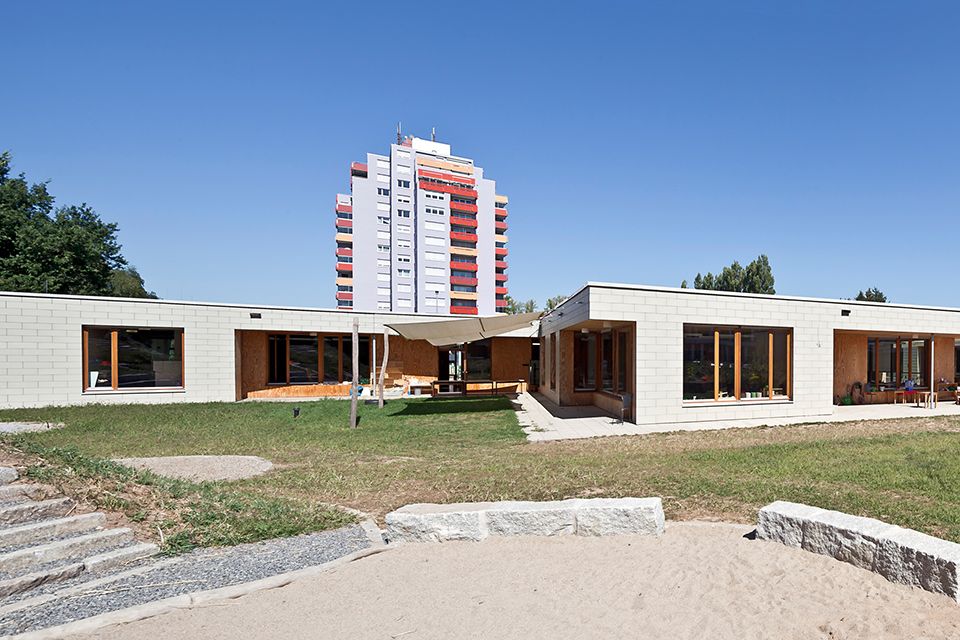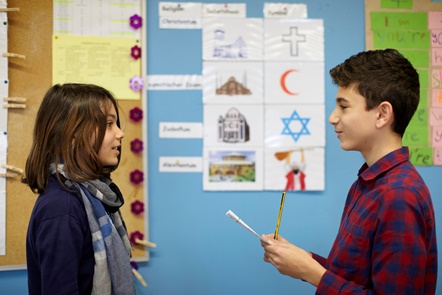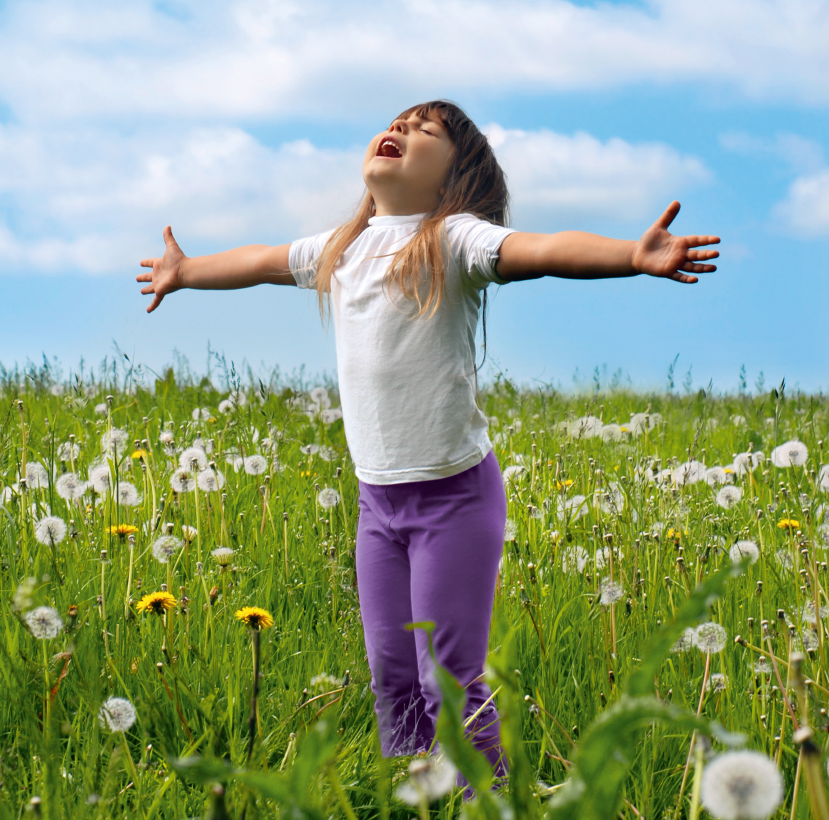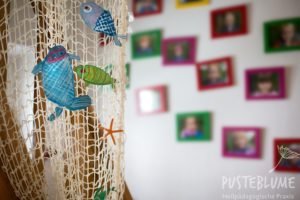Nativity scene, children’s home & primary school

Live and learn under one roof
The Montessori Center Ortenau e.V. (MZO) was founded in Offenburg in September 2009 by committed educators and parents in the sponsorship of a non-profit organization.
Based on the pedagogy of Maria Montessori, Emmi Piklers, Rebecca Wild and Elfriede Hengstenberg, the MZO offers continuous childcare and education from the first year of life to the end of primary school. In our facility, children live and learn in the areas of crèche, nursery and primary school "under one roof".
In our facility
- … we offer the children a “prepared environment” adapted to the respective age groups, in which each child can develop and develop at their own pace.
- … the children find a place to live and study.
- … the children are carefully accompanied in their personal development.
- … The children experience an accompanied transition from one area to the other, that is, from the crèche to the nursery to the elementary school, which is adapted to their level of development.
- … all pedagogical specialists (educators, teachers, honorary staff, interns) work together for the benefit of the children in a team and shape life and learning with the children together and also across departments.
The individual areas now introduce themselves to you.
Detached from everyday life, we want to create space for the children with their parents to experience themselves in a small group so that all topics can be addressed that relate to their child’s individual development.
The exchange among "like-minded people" often helps in this intensive time to bundle the necessary forces that require parenting every day anew.
Singing a mixture of songs, observing the child’s play in the now worthless and accompanying brief theoretical inputs from Montessori pedagogy, fill the morning.
We see ourselves as companions for parents with their children. Together we can learn again and again with and from each other, because each of us is unique.
Everyone can get involved in the group exactly as it is personally desired.
We are always open to questions.
If you are curious now, register in the parent-child group today. We look forward to you!
Maria Montessori recognized that every child is equipped with an "inner blueprint" that enables him to build himself and his own personality.
In our loving "prepared environment" we welcome children and their parents and accompany them a bit on their way.
Small children love to work in a manageable group with their peers. Play ideas for the senses help the baby and toddler to conquer their world. The understand with the hands prepares the way for the first words.
Together with parents we accompany and observe the children in the parent-child group lovingly on their way to independence, with their first steps into the world and see how they gain new experiences, discoveries, rejoice, laugh, play, first Make contacts and much more.
Parents get an insight into Montessori education and have the opportunity to implement it at home in the family. They can share their experiences in contact with other families.
The age difference of the toddlers in the group is about three months.
The next parent-child group begins on January 14, 2020. We are happy to accept registrations by email: [email protected].

crib
In the family rooms of our crèche, which are clearly arranged for the children, the children will find a prepared environment tailored to their needs.
Every child is a distinctive individual. It has a creative power within it, through which it will develop itself in the coming years, build itself up. This requires a loving reception and suggestions in the area. The small child achieves an enormous developmental achievement in the first years: It builds up itself, its mind, its world of senses and feelings, its will and its thinking according to its own “inner blueprint”.
In the first three years of life, it is the special task of nursery school teachers to carefully monitor the sensitive phases of movement, language and order that emerge at this age level.
Every child is born with the urge to learn and grow.
Maria Montessori recognized that every child is equipped with an "inner blueprint" that enables him to build himself and his own personality.
Small children love to work in a manageable group with their peers. Game ideas for the senses help that Baby and Toddler to conquer his world. Grasping with your hands prepares the way for the first words.
Usually opening times
| crib | children’s house | school | |
| Mon-Thu | 07:15 a.m. – 02:30 p.m. | 07:15 a.m. – 02:30 p.m. | 8:00 a.m. – 3:30 p.m. |
| Friday | 07:15 a.m. – 02:30 p.m. | 07:15 a.m. – 02:30 p.m. | 8 a.m. – 2 p.m. |
Extended opening hours
| crib | children’s house | school | |
| GT 1 | 2:30 p.m. – 3:30 p.m. | 2:30 p.m. – 3:30 p.m. | 07:15 a.m. – 08:00 a.m. |
| GT 2 | – | 3:30 p.m. – 4:30 p.m. | until 4:30 p.m. |
| GT 3 | – | 4:30 p.m. – 5:00 p.m. | 4:30 p.m. – 5:00 p.m. |
Holiday / closing days:
A better compatibility of family and work is part of the concept of the MZO. Therefore, the MZO is closed for a maximum of 30 days a year.
The regular school holidays apply to school children.
If required, the MZO offers school children an exciting holiday offer during the holidays and outside the closing days.
The parents register their child separately. The remuneration for holiday care including lunch is to be paid separately.
Regular visit to the facility and absenteeism:
In the interest of the child and the group, the preschool facility should be visited regularly at the agreed childcare times.
Daily attendance at school is taken for granted.
If a child is missing in the preschool area, the department head or the secretariat must be notified.
In the case of school children, notification is also required on the first day of absence.

children’s house
In two of our children’s house groups, up to 20 children between the ages of three and five are taught by three teachers. Interns supervised.
In the prepared environment of the children’s home, the children will find everything they need for their development, which is determined by the internal building plan. In addition to the Montessori materials, the children also have areas for role playing and construction, picture books, a studio and a workshop and a Movement space available.
In the age group of three to six year olds, children experience various sensitive phases in which they seem to learn a wide variety of skills with ease.
The common life in the children’s home is embedded in a daily routine that is manageable for the children. Social and understandable rules for children are a matter of course in our everyday life and are valuable for everyone.
In the third group of children’s homes, up to 15 children aged five to six years are cared for during the transition to primary school.
For the cooperation children, in addition to free work and the areas of experience in the children’s home, there is the option of registering for free work in school. You will be accompanied by a teacher and gently introduced to everyday school life. Beginners already know the universal Montessori materials from the children’s home and can continue their work from the children’s home at their own pace and level of development.
The cooperation children have the opportunity to get to know the changed daily routine in school and to slowly integrate themselves into the school.
Especially in the last year of the children’s house, the oldest children in the house go to school. They finally want to be a school child and spend the day with their great role models. Nevertheless, it is important to us that each child can make the transition at their own pace so that the children can choose when, how long and how often they go to school.

primary school
Our two school classes
In our two mixed primary school classes, up to 50 children live and learn with their two class teachers and other specialists in religion, music and French.
The children of this age group are guided by their inner blueprint and the sensitive phases of curiosity and a thirst for research. They want the "big" the "whole" and strive for an overview and orientation in the world. You want to understand relationships and like to delve into small details. In addition, the children of this age are on the way to abstract thinking.
The prepared environment of our primary school holds all the Montessori materials important for this age group in the areas of language, mathematics and cosmic education. As part of the daily free work, the children have the choice of which material and topic they want to deal with. After the material has been presented by the teacher, the children can work alone or with other children at their own learning pace at a location chosen by them. All other subjects such as B. Religion and music are taught in the class association.
The children learn to shape their everyday school life and take responsibility for their actions and learning.
Parent offers and cooperation with the kindergarten teachers enrich the school day. Again and again, the children have time to spend breaks in the outdoor area, in the reading room, in the construction and construction area or in the role-playing area.
Our school sees itself as a living space for the children. We carefully accompany the children in their personal development.
Maria Montessori does not refer to her material as a teaching tool that the teacher uses to bring the child closer to facts or to illustrate something, as teaching usually does. Rather, it is material for the hand of the child who learns to open up the world with the “key”. Montessori emphasizes two aspects, namely the importance of the material for the development of movement and the senses. Thus, the material can be seen as a development material.
The development material should have the following properties:
- Aesthetics:
The shape and color of the material is harmonious and of high quality. The child learns how to handle things carefully and carefully. - Activity:
The material must encourage the child to work, it offers specific opportunities for action. - limit:
Each material is only available once and therefore represents a quantitative limitation, which leads to social learning. Another limitation can be seen with regard to the learning step. The material isolates a difficulty and thus promotes concentration and anchors knowledge. - Self-control:
The material should give the child the opportunity to control the progress of their learning themselves. This makes it independent of the teacher’s assessment.
Three step lesson
The material is presented to the child by the educator or teacher when it is used for the first time. With this introduction (performance) the child first gets to know the material and then how to use it correctly.
Such an introduction should be short and clear. As few words as possible accompany this demonstration. The child does not have to concentrate on sweeping explanations and at the same time follow the action, it follows the sequence of movements and the work posture, which is analyzed in partial steps. That is why it is slowly and clearly shown how to work with the material. The necessary explanations (mostly names and terms) are given using the “three-step lesson”. To do this, you usually select three terms.
The three-step lesson using the example of geometric bodies:
To name
It is a ball
It is a cube
It is a cylinder
Detect
Give me the bullet
Give me the cube
Give me the cylinder
Identify
What’s this?
What’s this?
What’s this?
If the child is able to add more new terms, repeat the three-step lesson with the next terms. Otherwise, the other terms will be introduced at a later date. A performance usually lasts only 5-10 minutes. Subsequently, the educator / teacher offers the child to continue working with the material alone.
For many parents it is difficult to reconcile schoolchildren’s numerous vacations with work. For this reason, it is important to us to be able to offer uncomplicated childcare to children and parents during the holidays. Outside of the closing days, schoolchildren can take part in holiday care in the MZO.
The day begins with a breakfast together and then starts the holiday program strengthened. Seasonal projects determine the offer in the mornings. These are selected in consultation with the teachers or implemented at the request of the children. Different cooperations are also possible.
In the MZO and around the MZO, the holiday children start on practical as well as intellectual excursions that do not always find their place in everyday school life. Excursions are made, crafted, tinkered, cooked, played, experimented and everything else that is fun. Imagination has free rein and creativity is required. The strengthening of the class community becomes a sure-fire success. The children meet outside of everyday school life in new constellations and can deepen their friendships or find new ones. The familiar people and surroundings of the MZO offer the children a family atmosphere and security, especially during the holidays.
The holiday program is carried out in the morning. After lunch, the all-day vacation children have the opportunity to pursue their own interests in the form of free spins.
RELATED ITEMS
-

Cooperation between kindergarten and primary school
Orientation area (jump marks) The education portal: School system School system Basics School types Elementary school Language level assessment Transition…
-

ABC for children under three – kindergarten arche noah neuenkleusheim e
ABC for children under three Here you can find the ABC for children under three. Parents register their child in kindergarten in the form of a registration form…
-

Kindergarten day nursery – kindergarten martin-luther hameln
If we are to draw children, we must also become children with them. Martin Luther We are guided by the principles for working in…
-

Specialist service for integration in crèche, kindergarten and after-school care
Specialist service for integration in daycare facilities The Pusteblume practice offers for integrative daycare centers and regular kindergartens…
